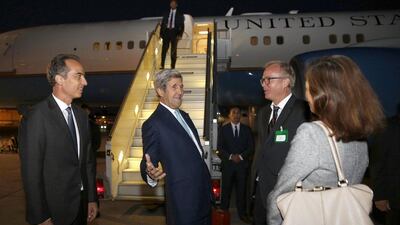GENEVA // American officials conceded an imminent ceasefire agreement for Syria was unlikely despite a fourth meeting in two weeks between US secretary of state John Kerry and Russian foreign minister Sergei Lavrov. Officials had suggested Mr Kerry wouldn’t travel to Geneva unless a deal was clearly at hand.
But agreement depends on Moscow’s ability to persuade its ally, Syrian president Bashar Al Assad, to cease offensive operations, and Washington convincing anti-Assad rebels — which the US supports — to stop co-operating with extremist groups such as Al Qaeda.
Despite months of diplomacy, neither side has succeeded. Meanwhile fighting rages on around the divided city of Aleppo, where nearly 700 civilians, including 160 children, have died in the last 40 days. With Assad’s forces tightening its siege there, Aleppo was high on the agenda for the Kerry-Lavrov talks.
America’s intelligence chief said Iraq and Syria may be beyond salvaging as nations. “I don’t know whether Syria and Iraq can be put back together again,” said CIA director John Brennan. “There’s been so much bloodletting, so much destruction, so many continued, seething tensions and sectarian divisions, that I question whether we will see the creation of a central government in both of those countries that’s going to have the ability to govern fairly.” Instead he envisions a federal structure of autonomous regions.

